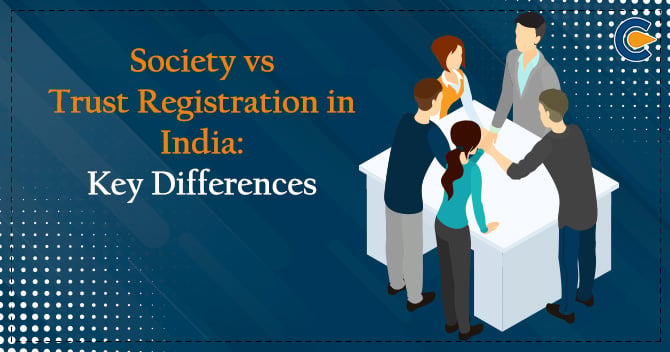In India, there are various forms of organisation which are established with the aim of providing services to the members rather than earning a huge amount of money. Trust and Society are two such organisations in India. Society is established when a group of people come together for a common charitable purpose. Whereas Trust is a legal arrangement in which an individual holds property for the sake of some other individual. The basic distinguishing feature between a Trust and a Society is the purpose for which they are created; once you know the purpose behind the establishment of a Society and a Trust, then you can easily differentiate Society and Trust. Scroll down to check the key differences between Society vs Trust Registration in India.
Definition of Trust and Society
Before we discuss the key differences between Society and Trust Registration in India, let’s first understand the meaning of Trust and Society.
- Society: It’s a group of individuals who are associated together for a common purpose, and the purpose may be related to promoting any charitable, literary, or scientific work. Society Registration is easy, require a minimum of 7 members to sign the MoA (Memorandum of Association) and then file it to the ROC (Registrar of Companies). Registration of a Society is done under the Societies Registration Act, 1860[1].
- Trust: It’s an entity created by a single party in which the second has the right to hold the first party’s assets for the benefit of the third party. Here, the first party refers to the Trustor or the author of the Trust; the second party or person is known as a Trustee, who accepts the proposal of Trust & maintains the Trustor’s property on behalf of the third party (beneficiary). The subject matter of the Trust is known as Trust Property & the document in which all the terms & conditions regarding the Trust are written is known as a Trust Deed. Now let’s discuss the Society vs Trust Registration (Key Differences).
Comparison Table of Society vs Trust Registration in India
You can check the comparison table of Society vs Trust Registration mentioned below:
| Particulars | Society | Trust |
| Meaning | Society is established when a group of people is associated together for a common charitable purpose, but it’s not limited to charitable purposes but may extend further to multiple other fields. | Trust is the oldest form of a charitable organisation. It’s an arrangement between parties whereby one party holds ownership over property on behalf of another person or individual. |
| Registering Authority | Registrar of Company | Registrar/Deputy Registrar of Societies of the concerned State or Charity Commissioner. |
| Governing Legislation | A Society is established under & governed by Societies Registration Act, 1960. | A Private Trust is established under & governed by the Indian Trust Act, 1882. |
| Objectives | Must be specific. | It can be general. |
| Document of Constitution | Memorandum of Association (MoA) and Rules & Regulations. | Trust Deed. |
| Minimum Members Required | A minimum of 7 members are required (5 for Jammu & Kashmir and Telangana). | A minimum of 2 Trustees are required. |
| Registration under the IT Act, 1961 | Allowed | Allowed |
| Transparency | Low | Low |
| Annual Compliances | The Society must file the list of names, addresses, and occupations of the Managing Committee members of the Society to the Registrar annually. | There are no mandatory yearly compliances to be met by a Trust |
| Nature of Control | Decisions are made by voting. A power struggle may ensure. | Settler (one-man control). |
| Amendments | Relatively more complex and both the Rules & Regulations and MoA need to be changed. | It can easily be done through a supplementary Trust Deed. |
| Family Members | The Registrar objects to family members becoming part of the Governing Body. | Can become Trustees. |
| Winding-up | It can be wound up if 3/5th of the members want. | Trust is usually irrevocable and cannot be wound up. |
| Geographical area of activities | Separate Registration for the All India level is required (8 members from different states are required). | All India (no need to mention this in the Trust Deed). |
| Tenure of Officer Holders | Members hold office for a period of time & may stand for re-election. | Trustees hold office for their entire life. |
| Issue of Name Approval | If any other NGO is not incorporated with the required name in the specific jurisdiction of Registration, then it’s possible, and if any other Society (NGO) is incorporated with the name in that Registrar, then it cannot be approved & provided. | Approval of the name is not required if the name is not under Emblem Act. |
| Transfer of Membership or Directorship or Trusteeship | Society membership is not transferable as per the Act. | There is no such provision to transfer the Trusteeship in the Indian Trust Act for the Charitable Trust as an NGO. |
| Can a Foreigner be a Director or Member or Trustee | A foreigner can be a society member with certain permission & terms of the Indian Government & the concerned Union Territory of India where the Registration Process is applied. | There is no restriction & provision for foreigners to be or not be members. So foreigners can be Trust members, but certain Government Rules & Regulations are applied. |
| Eligible for College or School Formation | Society is eligible for College or School formation in all States of India, including Rajasthan. | Trust is eligible for College or School formation except in a few certain States like Rajasthan. So if anyone desire to form College or Scholl in those States, you need to register as an individual Society & can run a Trust as an NGO for social development works. |
Conclusion
After discussing the difference between Society vs Trust Registration, it is clear that the purpose behind establishing a Trust is that an individual will hold another individual’s property for the benefit of a 3rd individual. In contrast, Society is created to promote any literary, charitable and other similar objective.
Read our Article:How to approach NGO Registration in India? Forms & Features











